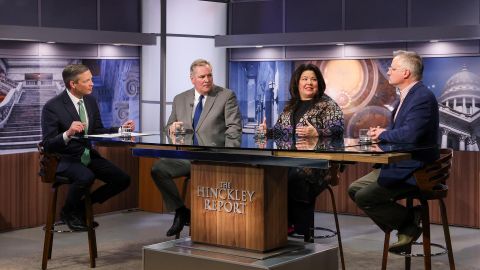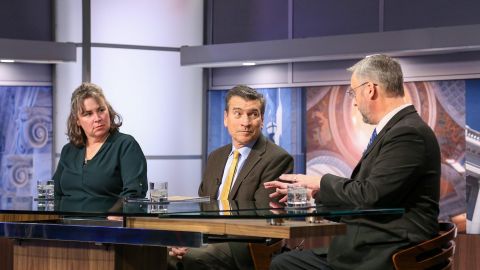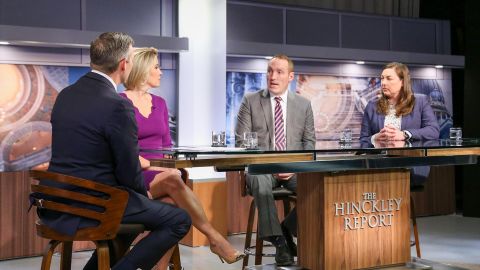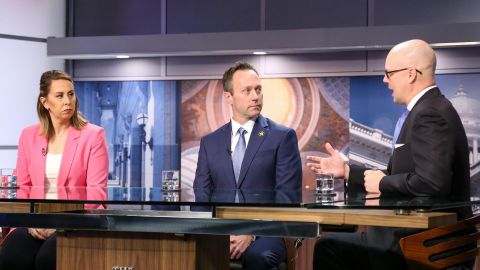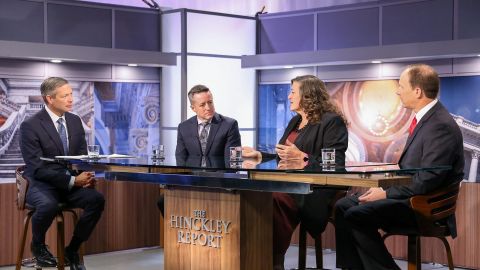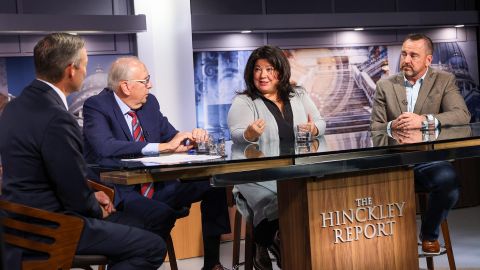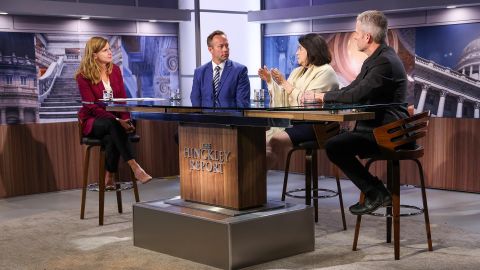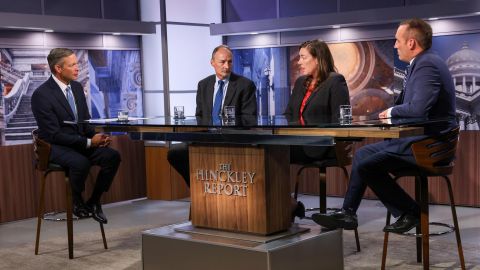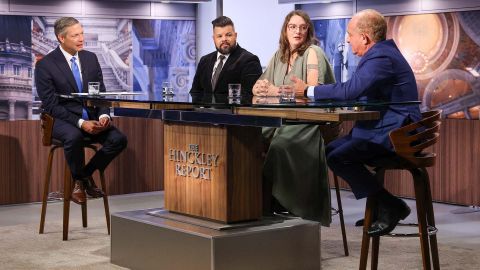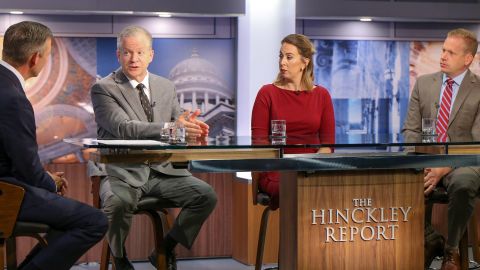announcer: Funding for "The Hinckley Report" is made possible in part by the Cleone Peterson Eccles Endowment Fund.
Jason Perry: Tonight on "The Hinckley Report."
Congress once again comes to the brink of a government shutdown.
Voters get a second look at Republican hopefuls as they take the debate stage.
And Utahns react as polarizing national issues hit close to home.
♪♪♪ ♪♪♪ Jason Perry: Good evening, and welcome to "The Hinckley Report."
I'm Jason Perry, Director of the Hinckley Institute of Politics.
Covering the week we have Robert Gehrke, columnist for the Salt Lake Tribune; Heidi Hatch, anchor with KUTV 2 News; and Max Roth, anchor with Fox 13 News.
So glad to have you on the program this evening.
A lot is happening, and a lot of what happens in the future is weighing in the balance this very evening.
I want to jump right into it, Heidi, starting with you.
We have our federal government until tonight, Friday night, to pass a budget or shut down the government.
Heidi Hatch: It used to be shocking, now it just seems like it's a rite of passage.
It's fall allergies.
People put up their skeletons and we talk about a government shutdown.
This actually affects people's lives.
It's a real issue, but it drives me nuts that it doesn't have to be.
I know that we all work well under pressure, and you can get things done at the 11th hour, but it doesn't have to be done this way, it's not the best way to do it, and it's getting frustrating watching it happen and play out, because there's a lot of political theater instead of the actual work we want our congressional leaders to be doing.
Jason Perry: Yeah, Max, we talk about what Congress's responsibilities, one of them is to pass this budget.
But there is a lot of political theater, as Heidi has mentioned here.
What are some of those items, what's taking up the space in these last minutes?
Max Roth: You know, the person, there is one person at the center of all this where all the pressure is, and that's Kevin McCarthy, the Speaker of the House, and he-- his job's on the line.
I mean, essentially that's, you know, there is a coalition that could be put together to pass a continuing resolution right now.
The Senate has passed something, and if the House Republicans who want to avert a shutdown, they could get plenty of Democrats to join in with that.
But if McCarthy opens that up as an option, he loses his votes to be Speaker.
And part of the agreement that he made when he was becoming speaker was that any person could bring him up for a vote.
And if that were to happen after he did that, he'd lose that job.
And that's-- that-- it feels like that's really what's on the line here.
That's why we're getting to this point.
Robert Gehrke: Twenty years ago when I went to D.C. to-- for-- to cover Washington, they were still passing appropriation bills.
They have 13 appropriation bills, they passed them almost every year, and now it's like we just keep kicking this can down the road with continuing resolutions.
We have this brinksmanship that always comes up.
We have, you know, these small factions of conservative Republicans in this case who can just shut things down because there's-- it's a balance, you know, it's a 50/50 Washington.
But, you know, and maybe in some respects, it's going to be a good thing, because it's going to remind people the things the government does that they're going to miss when they're gone, things like national parks.
But it's also gonna impact a lot of people too, because there are a lot of people who rely on some of these programs for their wellbeing.
Jason Perry: I wanna get to a couple of those.
Heidi, maybe we'll talk about sort of that brinksmanship idea here and what's-- what the posturing has been from some of our own elected officials.
I wanna bring up a tweet from Senator Mike Lee this week about this very issue.
You maybe can even tell us what he's alluding to in this particular statement.
This is from Senator Mike Lee.
He says, "No one wants a shutdown, but there are no harmless options on the table.
If there's a meaningful chance that '15 days' could 'stop the spread' of massive-deficit spending-- which is impoverishing America's poor and middle class-- that option should be considered."
What's this 15 days, and what are these options he's telling us we should look into?
Heidi Hatch: Is it too soon for pandemic jokes?
But that's what he's talking about, you know, the 15 days to stop the spread, which obviously didn't happen.
And I think he's saying, you know, what if we had a couple of weeks to, you know, work this out and maybe that would get us to the point we need to be?
But what we have to remember is if you look up in the Ogden area, we have IRS employees, a lot of them making $15 an hour, and while they're furloughed, they'll all eventually get their paychecks.
If you're making $15 an hour, you're probably living pretty close to paycheck to paycheck.
So, 15 days is a long time when you don't know if you're getting that paycheck and if you can make your bills.
So, well, it may be enough for them to get whatever side they want, whether it's Democrats or Republicans in Congress, it's hurting the little people at home in Utah who need to buy groceries, pay the rent, and just do life.
Jason Perry: Go ahead, Robert.
Robert Gehrke: When that first clause of his quote there, no one wants to shut down, I think he does want to shut down.
I mean, he voted against the spending package, the continuing resolution that passed the Senate that's going to die in the House, presumably.
I think, you know, Matt Gaetzs of the world want to shut down.
It's-- there are some people who want this shutdown, and it gives them leverage, I think, to start negotiating a little harder to try to get some spending cuts like Mike Lee is trying to do.
Is that right?
Is that wrong?
It's, I think to Heidi's point, absolutely.
There are people who are gonna be profoundly impacted by this.
Jason Perry: Yeah, Max, last time this happened, our national parks had a serious hit, and the state had to step in.
Talk about what happened then and what Governor Cox is already saying he wants to do now.
Max Roth: Well, the state spent, I'm trying to remember, it was somewhere around $40,000 to keep the parks open, and they haven't gotten paid back.
But you think about those communities outside the parks, and that's the big concern, is that you got a Springdale or a Moab or a Torrey, you know, and those are places that really rely on the revenue that comes from visitors to those parks.
But so, Utah wants to keep those open.
I know that our delegation wants some assurances that the federal government will pay back, because that didn't happen last time.
Jason Perry: Yeah, in fact, Heidi, Senator Lee this week has introduced some legislation saying that the Department of Interior shall pay back the state of Utah if we incur some expenses.
Heidi Hatch: And I think that went up for a vote and failed.
There's been several resolutions where they were trying to make it less bad if they did go into a government shutdown, but all of these resolutions, I think, in the minds of voters when you're talking to them at home, they're like, what did you do over your summer vacation?
Why didn't you come up with the amendments then?
Why did we not start working through it?
Well, this is just how Congress works and that brinksmanship is sort of how we do business now.
But it's definitely not the gold standard, and it hurts people.
It definitely affects people.
I think when you look at the numbers, the National Park service, every dollar that goes into the parks, $15 will be made in those smaller communities that Max was talking about.
And so, there's a large ripple effect when we get to this brinksmanship, which, again, is how we do business.
But is there a way we can pull back from this and stop living in the continuing resolution world?
Max Roth: Absolutely, and that's a great point.
I think, and another point is that, aside from the national parks, I mean, maybe we keep the national parks open by the state stepping in, but Robert and I were talking earlier about being on the San Juan River, and-- this past summer and spring, and both of us have been there, and when you're going there, you-- Heidi Hatch: I'm sad I didn't get an invite, rude.
Max Roth: Next time, next time I've got room.
And so, when you-- but when you put in for a permit, you get a call back from a BLM River Ranger, and there they talk you through everything, all the policies that you have to go through.
Robert camped at the put in, you know, before going, and there are facilities there.
And for folks who are local, these beautiful places in Utah that aren't in national parks are on federal land.
The campgrounds are federal, those are places that don't get someone to step in and keep them open, and so there are a whole lot of people who are listening to us right now who maybe have a campground reservation for fall break and wonder if they're gonna be able to go.
Robert Gehrke: It's up in the air now.
And it does seem like this is the new normal.
Like, we just keep seeing this over and over.
Like Heidi said, it's an annual thing, even more often than annual now because these resolutions often are only six months at a time.
It's, you know, it's no way to run a government, and I think they-- I think hopefully we should be able to do better.
Max Roth: Just one other thing when you talk about the folks up in Ogden working at the IRS and those things, it's almost more of a curse to be considered necessary and to have to stay at work, because the folks who are doing that, like people in the military even, they work, but they don't get a paycheck until the government starts operating fully again.
And that's-- and everybody ultimately gets paid after these things are done.
And so, the folks who are said that they're, you know, who are necessary to keep working, they really suffer.
Robert Gehrke: My father was an air traffic controller, exactly that same thing, right?
You know, when there is a government shutdown, he's still got to go to work, but, you know, you feel it in the home.
You know, it's not fun to have to tighten the belt.
Max Roth: And you don't want your dad to be unfocused and, you know, upset while he's doing that job.
Heidi Hatch: It sends the wrong message to a lot of those families that do serve.
I saw a couple of people posting on lives-- wives who have husbands who are in the military, saying, you know, they're living in third world countries camping out, we'll get our paychecks, but it's delayed while we're also sending money to Ukraine so they can pay their bills.
But then we're not paying the service members here.
So, it's mixed messaging, I think, that's frustrating.
Jason Perry: Before we leave this one entirely, since you talked about these impacts, and there are many, my question for you is really this.
When Utahns and Americans look at it, who are they blaming?
We have some idea from last time, but who's to blame, do you think, in the minds of who you're talking to?
Heidi Hatch: I think probably a couple dozen super conservative Republicans in the House right now.
But it kind of depends on who the president is and who the opposition party is.
So, I think maybe Republicans will get the blame this time.
Robert Gehrke: It feels like since the Senate's passed a bill, the House is going to kill it, and it's this small group, like you said, of the conservative Republicans, I think they probably get most of the blame.
But I think it's also, like you've heard from us today, it's a pox on both their houses.
You know, you've got to do better.
We send you there to do one job, and you can't do it.
It's your most fundamental thing Congress is supposed to do, and they can't even manage that.
It's-- I think people rightly are disillusioned with the system.
Jason Perry: Yeah, but Max, a couple of them are gonna be campaigning on this very issue, aren't they?
Which side they take on this one.
Max Roth: And it's interesting how they-- because most of the messaging in this is about budget and reining things in and that's what you hear from Senator Lee, but a lot of it is also about border security, and that's what Burgess Owens who's gonna-- who's very much on that conservative side of these things is saying that, you know, in his-- talking about why he doesn't want to just continue this is because he wants a more-- more border security.
And that's a whole lot to put on one issue.
Robert Gehrke: My point about the, you know, people being disillusioned, I think that's why you see people like John Curtis trying to pass this resolution that says we're not going to get paid until there's a budget in place.
And I think, you know, you look at that, and people are sitting at home, like, well, that makes sense.
If I'm not doing my job, I'm not gonna get paid for it, right?
So, there doesn't seem to be much support for that.
He's tried it before, but, you know, I think it resonates with people for the reason that, you know, we all have to do our work, you know, and if we don't do it, we're not gonna get our money.
Jason Perry: Yeah, Heidi, you mentioned just a moment ago, one of the items being discussed as part of these budget negotiations is Ukraine, the amount of money that we are sending there.
We have a student that has submitted a question.
I'd love you to take the first shot at the answer for the-- from Maddie at the University of Utah.
Maddie Hair: My name is Maddie Hair.
I'm a senior at the University of Utah majoring in Economics, Political Science, Health, Society and Policy, and Psychology.
My question is on the issue of Ukraine.
Republicans seem to be divided on whether or not we should lend our resources to Ukraine.
Do you think that supporting Ukraine advances American interests?
If so, to what extent should we support them?
Heidi Hatch: I think that Utahns recognize that having a stable world and peace in some of these important countries is important to the stability of the rest of the world, but I think there's frustration because people don't really know why we're in it, what we're getting out of it.
I think in the early days, there was real concern for the people of Ukraine.
We opened our doors and homes saying, you know, come here if you need some place, you need safety.
But I think there's just been changes along the way where we'll do this, but we won't do that.
And then we just keep moving in the direction of saying we wouldn't, so people are wondering what are we doing?
What is our money going to?
If it's going there, are we still taking care of things at home?
So, I think people genuinely care about Ukraine, but at the same time too, they care about what's happening in their own families and neighborhoods and don't know where that balance should go.
Robert Gehrke: Yeah, I mean, I think people like Senator Lee, they don't want this to be an open ended blank check, and it's hard to see a resolution to this.
We don't know how long this is gonna last and how much-- how many more millions of dollars are gonna be going there.
At the same time, and it was even brought up and we're gonna talk about the presidential debate later, but even in the Republican presidential debate, I think Mike Pence said every time every, you know, a win for Russia or if we let Ukraine fall, it helps China, it helps Russia, it weakens the United States.
And so, even I think conservative Republicans see that there is national interest in trying to maintain balance in the Ukraine Russia, you know, paradigm.
So, I think it would be a huge mistake personally for us to walk away from it and let Ukraine fall, and without the United State's support, that would certainly be the outcome.
Max Roth: And it seems like there's a certain-- there's a certain sense in this, like, when you ask can-- will we ever get out of it?
Is it just a blank check?
Well, the big uncertainty here is that it's a war that started in a system that's run by just one man.
Where it's a Vladimir Putin, in this case, and so when it's just the whims of one person who-- that can do this, then it's something-- it's hard to say, yeah, we're going to capitulate, we're going to let that happen, especially in a Europe where so many of our allies are on the borders of Ukraine already.
And that's a scary thing to think a NATO country would suddenly get involved with this or would get invaded.
And so, yeah, it's in a sense defending a democratic nation that's been invaded by one man, really.
Jason Perry: Well, that's why, Robert, it's interesting.
You see, like, Senator Mike Lee even putting out a tweet saying this is our flag and this one is not our flag, the United States flag versus that of Ukraine.
Robert Gehrke: Yeah, I mean, but Mike Lee also at the start of the war called Vladimir Zelenskyy the Martin Luther King of his country, right?
And so, he was very much in favor of it.
Now as it's dragged on, I think he's lost his will.
And I think that's a mistake.
I mean, think, you know, we need to be a counterbalance to Russia.
We can't let nations fall under Putin's boot.
And if Senator Lee had his way, that's exactly what would happen, I think.
Heidi Hatch: Yeah, and Zelenskyy was an exciting GI Joe at the beginning of it, but then when you take a step back, I think people realize that they want Ukraine to be stable.
They don't want Russia to take over, but they're not positive that the money is going to be used wisely with Zelenskyy because, you know, the government may not be completely clean and using the money in ways we would ask them to.
Jason Perry: Well, this issue is so important that it did get right into the Republican debate this week, became something that many of the candidates are talking about, how they would resolve it, where they are with the two of you.
I'd like to play just a video clip here for just a moment that gives some of the high level themes, and if you look at this, and Max, if you'll answer the question, kind of through the the Utah lens, which issues are resonating?
Mike Valerio: As seven GOP presidential hopefuls took the stage at the Ronald Reagan Presidential Library Wednesday night, the party's frontrunner was once again absent.
Ron DeSantis: Donald Trump is missing in action.
Chris Christie: He put $7 trillion on the debt, he should be in this room to answer those questions for the people you talk about who are suffering.
Mike Valerio: With a smaller stage down one from their last debate, the candidates fought to break through.
Stuart Varney: Gentlemen, you'll have your turn.
[crosstalk] Mike Valerio: The man at the center lectern, Ron DeSantis, went into the night with a lot to prove, once considered the party's best hope of dethroning former President Donald Trump.
The Florida governor has lost ground in recent polls.
Ron DeSantis: As commander-in-chief, I'm going to use the US military to go after the Mexican drug cartels.
They are killing our people.
Mike Valerio: After memorably clashing with several rivals in Milwaukee, entrepreneur Vivek Ramaswamy said his goal this time around was to stress his policies and positions.
Vivek Ramaswamy: Unlock American energy, drill, frack, burn coal, embrace nuclear energy, put people back to work.
Mike Valerio: And former South Carolina Governor Nikki Haley looked to build on the momentum her campaign received from the previous debate.
Nikki Haley: We need to make sure we put 25,000 more border patrol and ICE agents on the ground and let them do their job.
Mike Valerio: In Los Angeles, I'm Mike Valeri.
Jason Perry: A lot there, Max.
Max Roth: There-- a lot there.
I'm not sure, you know, in terms of the rhetoric, I'm not sure about the substance that's all there, and there's this gravitational pull from the frontrunner that draws so much attention that I'm not sure, you know, you were asking before we saw that what resonates in Utah.
I don't know, because I'm not sure how much attention is being paid to that debate.
Not a whole lot of people viewing that this early on.
It seems like there's not enough air in the room for any of them.
The person who's gotten the most support from Utah politicians is Ron DeSantis, and he seems to be falling back.
And so, this-- Utah hasn't been a big Donald Trump state for a red state, but it's-- he's at the center of things, and it's such an odd circumstance, because he's also at the center of four major lawsuits or criminal cases.
Robert Gehrke: I hadn't watched the debate until I heard that we were going to be discussing it.
I watched it, and I'm never gonna forgive you for that.
It was painful to watch.
I mean, the talking over each other, nobody really distinguished themselves, nobody looked like a leader, I don't think.
But I think the border issue was a big one that I think resonates in Utah, and they talked a lot about managing the debt, controlling the debt.
But yeah, I think for-- by and large, I think very few people were watching it because it was hard to watch and only people who are, like, really tuned into politics are gonna sit through two hours of people shouting at each other.
And so, I don't think anybody emerged as a winner.
I think Nikki Haley had an opportunity to distinguish herself, and Vivek Ramaswamy had a chance to kind of build on his first performance where I think he stood out, but I don't think anybody did.
And so, in terms of putting a dent in Trump's, you know, patina, I don't think that worked.
Jason Perry: Heidi, right before I leave this one, everyone mentions the fact that Trump is not there.
Does that mean-- is he winning by not participating?
Heidi Hatch: I think he's winning, but somehow he is because we're still talking about him.
He's getting his message out there.
But the thing is, is while people aren't listening and it's frustrating to listen right now, we may really need to be paying close attention, because when you look at President Biden and former President Trump, they both have some political balls and chains around their ankles that may literally take them out of the race in the next year.
And we're going to have to look to who's on the bench, who do we want to move forward possibly?
And so, these debates matter.
But yeah, it was too much squabbling for my brain this week.
Robert Gehrke: I mean, just the talking over, bickering, I don't think that looks presidential.
And so, to your point, yes, I think Trump elevating himself staying above the fray, which is something that's probably very out of character for him if we, you know, looking at his history, but, like, I think that's-- that helps him.
There would be nothing to gain for him by being there.
Jason Perry: Let's talk about the bench a little bit now too because Utah is going to be in play once again, whoever's in the White House is gonna have it be impacted by who's in our Senate seat and maybe our congressional seats.
So, Max, I want to start talking about what's gonna happen in Utah.
We've had some movement this week on the person that will take Senator Mitt Romney's position.
And let's talk first, the Speaker of the House officially announced this week.
Talk about Speaker Brad Wilson, his approach, his announcement.
Max Roth: You know, it feels like a pretty skillful approach that he's taken.
There's almost this sense that he's acting kind of inevitable, in a way, and I don't think that's the case, but he's going forward.
He's saying, I'm thinking about running, and then he makes an announcement that he's going to have an announcement, and as he announces, he's surrounded by politicians, Republicans in office from different parts of mostly the Wasatch front, but still, well, Morgan County is kind of Wasatch back or Wasatch in the canyon.
But anyway, it's-- but that, you know, he clearly is at the center of things right now.
Now, if a John Curtis, Representative Curtis, were to jump in, that's somebody else who has that kind of level of visibility who would also be a real contender.
There's so many people.
When you have an open Senate seat, I mean, that's something that everybody who's ever thought about it wants to jump in on.
That's so true.
It's so rare to have this open window like this.
Go ahead, Robert.
Robert Gehrke: I was gonna say, yeah, when Senator Romney ran, it was technically an open seat, but he'd already kind of been anointed.
You know, he had a challenger, but yeah, we don't see these very often.
I've always thought that the Speaker of the House always thinks they're more well known and well liked than they are, because if you think about it, the last Speaker of the House who actually won a statewide office, I believe, correct me if I'm wrong, was Norm Bangerter.
Rob Bishop run a congressional seat, but I, you know, they-- we've had people try to run.
Greg Hughes, for example.
And they just aren't as well known or well liked as they think they are, because they're so used to everybody at the Capitol, you know, kissing up to them, and then it comes time to put their name on a ballot statewide, and 80%, 90% of the people that they're trying to get to vote for 'em don't even know who they are.
So, I think if John Curtis gets in the race, I think that's a game changer.
I don't think Brad's frozen out the field and solidified his support the way he needed to.
I still think there's a chance Jason Chaffetz gets in the race, which would be a big name to challenge him.
And so, you know, Brad looks good right now, and I agree with Max that he's done everything right up to this point, but it's still far from being decided.
Heidi Hatch: I think it's a hard translation, like you said.
He's a big fish in a small pond, but I think when you step away from Capitol Hill and ask the average everyday Utahn who the Speaker of the House is, they probably couldn't answer that question.
So, I think he has his work cut out for him, and I think we're gonna have a long list, seven, eight candidates possibly.
Jason Perry: Heidi, what happens if John Curtis does jump in?
Because he's been in this position for a little while, has a bigger constituency that have interacted with him.
How does that change the race?
Heidi Hatch: I don't know if he would be the odds on favorite either, because I think that he in his congressional time has been fairly quiet compared to some of the other members, where I don't think he's been out there selling his name and his brand.
So, I definitely think he'd have a leg up in that he's in office already, but I don't know that he's a for sure deal either.
So, I think it's really open.
Robert Gehrke: The name we haven't mentioned yet, I mean, Blake Moore I've heard is also still considering it, but Tim Ballard was the guy that looked like he might actually make some noise because he had this big movie about him, he had this following for his child trafficking work, but his-- he's fallen apart spectacularly with the-- I mean, it's hard to envision a guy running for Senate when the LDS church has branded him morally unacceptable.
I mean, those hit pieces write themselves at that point.
And so, I think his campaign has kind of fallen apart with these allegations of the sexual misconduct and, you know, the shady business dealings.
Max Roth: You know, and I think that that's absolutely true, and, then we can get more into Tim Ballard, but I did wanna say that a Ballard or, I mean, maybe a Chaffetz, but in the Republican party of today, who's the Trumpy candidate?
You know, who's the candidate who's on that end of things?
Trent Staggs doesn't have-- yeah, yeah, and so, because Brad Wilson and John Curtis don't fit that bill so much.
Jason Perry: So, what are the lanes then?
I mean, and talk about the Tim Ballard factor for a second, Heidi, because you've been doing some great reporting on this thing too.
And keep in mind through this context, our Attorney General Sean Reyes, I think, at one point that was-- he was going to endorse Tim Ballard, but just this week came out through one of his spokespeople saying he-- Sean is not going to support Tim Ballard.
What does that mean in context?
Heidi Hatch: Well, I think that there's been a lot of oxygen going towards this conversation in Utah because Tim Ballard has been made into a superstar of sorts with this movie coming out.
And I think even in the last election, there's been a lot of talk about human trafficking, which I think is an extremely important issue.
But there's created some deep divides of where people back him and don't.
And oddly enough, I think if he were saying he were getting in the race today, there would still be a lot of people who support him and don't believe these allegations.
So, I don't know, it's all very confusing.
Some people say that he wasn't even intending to run for the Senate, and it was just a way for him to say this was a political hit knowing that the deck of cards was going to start falling, the dominoes falling against him at some point.
And it would be a way for him to in some ways defend himself, but definitely not great for Sean Reyes either, who had alluded to supporting him.
Jason Perry: Robert, just give us in our last few seconds on this sort of the path here, because we've been talking about the conservative candidates, the moderate candidates, looks like some are kind of stacking up on top of each other.
Robert Gehrke: Yeah, I mean, if Curtis and Wilson both get into the race, then they are kind of competing for the same voters, I think.
Trent Staggs is definitely trying to, as Heidi mentioned, trying to define himself as the Trump candidate, but he's not getting, you know, he's not that high profile.
He has had a Kari Lake came and campaigned for him, which is a pretty big name in that world.
And so, I think there is still room, as we've been talking about here, for other candidates to get in, a Jason Chaffetz or a Blake Moore or somebody like that.
Jason Perry: That's gonna have to be it.
So much to follow.
Thank you for your insights this evening, and thank you for watching "The Hinckley Report."
This show is also available as a podcast on PBSUtah.org/HinckleyReport or wherever you get your podcasts.
Thank you for being with us.
We'll see you next week.
♪♪♪ ♪♪♪ ...







